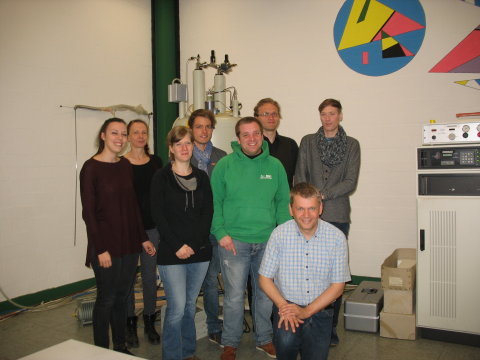Report to the 16. DMG Shortcourse "Applications of Solid State NMR Spectroscopy in the mineralogical and geoscientific research "
in Bochum from 17. May – 20. May 2016

After 16 years, one can speak about a tradition and again, Dr. Michael Fechtelkord from the Ruhr-University (Bochum) introduced the quantum mechanical principals of solid state NMR spectroscopy and possible applications in mineralogy and material sciences to many interested students from Regensburg, Freiberg, Karlsruhe, Weimar, Jena, Salzburg and, of course, Bochum.
The 16th DMG short course on solid-state nuclear magnetic resonance spectroscopy, held from the 17th-20st May at the Institute of Geology, Mineralogy and Geophysics of the Ruhr University Bochum (Germany), covered a wide range of topics, suitable for NMR beginners and advanced learners. Starting with a solid theoretical foundation on NMR spectroscopy, Dr. Fechtelkord introduced the 1H spin-lattice relaxation, magnetic dipolar interactions, the Magic Angle Spinning (MAS) method, 2D multi-pulse techniques, Cross-Polarization MAS (CPMAS), Double rotation (DOR), Multiple Quantum MAS (MQMAS) and Satellite Transition Spectroscopy (SATRAS). Each day was split in a theoretical and a practical session, in which the participants could actively implement their theoretical knowledge on the institute’s Bruker ASX 400. Optionally, students had the opportunity to earn 3 credit points (ECTS) for a passed exam.
I would like to thank Dr. Fechtelkord for this terrific and perfectly organized short course, in which he did not only comprehensibly introduce this complex and versatile method, but also proved the significance of spectroscopic NMR investigations in mineralogy and material sciences.
Ralph Michael Bolanz (Jena)


